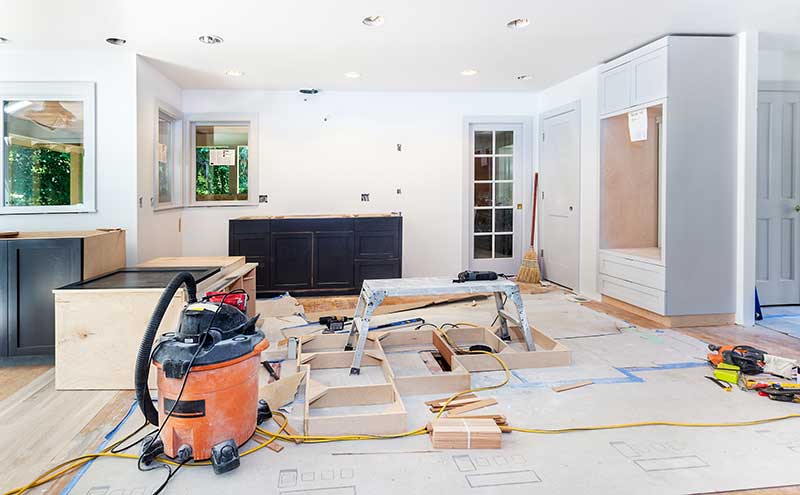Essentials for a Successful Home Renovation Journey
Embarking on a journey of renovating your home can be both exhilarating and daunting. According to recent studies, more than 60% of homeowners are planning on renovating their homes, with the kitchen and bathroom being the most common areas of focus. A successful renovation requires thorough planning, a clear vision, and an understanding of the process. This guide is designed to provide you with all the necessary information and tips to ensure your home renovation journey is not only successful but also enjoyable.
Define Your Vision
Before you dive into selecting paint swatches or tearing down walls, it is essential to have a clear vision of what you want your renovated space to look like. Spend time browsing through magazines, websites, and social media platforms like Pinterest to gather inspiration. Consider how you want the space to function, the feeling you want it to evoke, and the style you are aiming for. Having a solid vision in place will guide every decision you make moving forward and help communicate your ideas to professionals you may hire.
Set a Realistic Budget
One of the most critical steps in a home renovation project is setting a realistic budget. Costs can quickly spiral out of control if not carefully managed. Start by researching the average cost of similar projects in your area. Factor in costs for materials, labor, permits, and a contingency fund for unexpected expenses, which should be around 10% to 20% of your total budget. Sticking to your budget will ensure that your project does not put undue financial strain on you.
Choose the Right Contractor
Selecting the right contractor can make or break your renovation project. Look for someone who is not only skilled and experienced but also communicative and responsive. Ask for references and check them diligently. It is also advisable to get quotes from at least three contractors to compare prices and services. Remember, the cheapest option is not always the best when it comes to quality workmanship and reliability.
Secure Necessary Permits
Many homeowners overlook the importance of securing necessary permits before starting their renovation project. Failure to obtain these can result in fines, delays, or even having to undo completed work. Check with your local building department to understand which permits you will need based on the scope of your project. Though it may seem like a hassle, obtaining permits ensures that your renovation complies with local building codes and regulations.
Design with Functionality in Mind
While aesthetics are important, functionality should never take a back seat in any home renovation project. Consider how each space is used and who uses it when making design decisions. For instance, if you are renovating a kitchen, focus on creating an efficient layout that enhances workflow. Incorporating ample storage options can also significantly improve the functionality of spaces such as kitchens and bathrooms.
Invest in Quality Materials
To ensure that your renovated space stands the test of time, invest in quality materials. While it may be tempting to cut costs by choosing cheaper alternatives, this can often lead to higher expenses in the long run due to repairs and replacements. Select durable materials that are not only aesthetically pleasing but also able to withstand daily wear and tear. Consult with professionals to understand which materials offer the best balance between quality and cost-effectiveness.
Plan for Disruptions
Renovations can disrupt daily life in ways you might not anticipate. Prepare yourself and your household for disruptions such as dust, noise, and changes to your daily routines. Set up temporary living arrangements if necessary, especially for large-scale renovations that affect significant portions of your home. Planning ahead for these disruptions will help minimize stress and make the renovation process more bearable for everyone involved.
Incorporate Energy-Efficient Solutions
Incorporating energy-efficient solutions into your renovation can lead to significant savings on utility bills while also benefiting the environment. Consider options such as LED lighting, energy-efficient appliances, low-flow toilets, and sustainable materials. Many local governments offer incentives for homeowners who choose energy-efficient upgrades, so be sure to research what might be available in your area.
Maintain Open Communication
Maintaining open communication with your contractor and any other professionals involved in your renovation is crucial for its success. Regular meetings or updates can help ensure that everyone is on the same page regarding timelines, changes, and expectations. Do not hesitate to voice any concerns or questions you might have throughout the process. Effective communication will help avoid misunderstandings and ensure that your vision is realized as planned.
Document Your Journey
Documenting your renovation journey can be incredibly valuable for several reasons. It allows you to track progress, manage receipts and contracts, and provides a record of decisions made throughout the process. Taking photos before, during, and after the renovation can also offer visual documentation of the transformation. This documentation can be useful for future renovations or if you decide to sell your home.
Final Thoughts
Rome was not built in a day, and similarly, a successful home renovation takes time, planning, and patience. By defining your vision, setting a realistic budget, choosing the right contractor, securing necessary permits, designing with functionality in mind, investing in quality materials, planning for disruptions, incorporating energy-efficient solutions, maintaining open communication, and documenting your journey, you are well on your way to creating a space that meets both your aesthetic preferences and functional needs.

